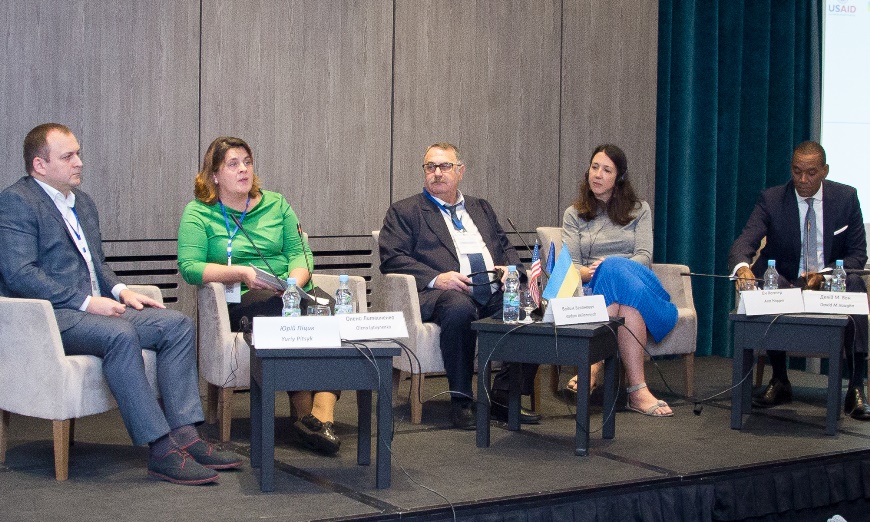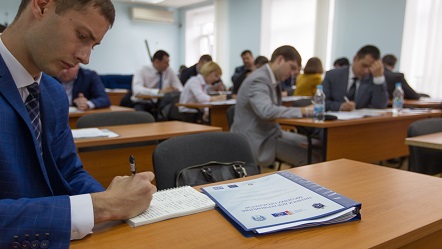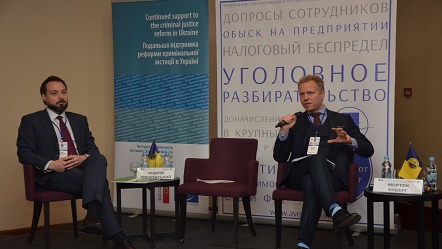On 19 - 21 October two events concerning the issues of disciplinary liability of judges and prosecutors were held in Kyiv - international conference “Disciplinary liability of judges and prosecutors in Ukraine” and workshop “Disciplinary proceedings against judges and prosecutors in Ukraine”, organised by the High Council of Justice (HCJ) and Qualification and Disciplinary Commission of Prosecutors (QDCP) in cooperation with the Council of Europe Project “Continued support to the criminal justice reform in Ukraine”, funded by the Government of Denmark, and the USAID “New Justice” Program.
The events brought together more than 90 participants: members of HCJ, QDCP and their secretariats, judges of the Supreme Court (SC), representatives of the Council of Judges of Ukraine, General Inspectorate of the Prosecutor General’s Office of Ukraine, Council of Public Prosecutors of Ukraine, National Academy of Public Prosecutors of Ukraine, lawyers and other justice sector stakeholders took part in the events.
Check the agenda of the conference and workshop here
International Conference
The purpose of the conference was to introduce participants to international and European standards related to disciplinary liability of judges and prosecutors. It was also important to analyse current situation and challenges related to conducting disciplinary proceedings against judges and prosecutors in Ukraine in order to bring such disciplinary practices in line with recognised global standards. The discussion within the conference also touched the ways of ensuring fair, transparent and consistent approaches to disciplining judges and prosecutors by the newly established HCJ, QDCP and SC.
"I am sure that today's event is of a particular importance in the context of the reform of the judiciary and the reform of the prosecution service in Ukraine. This conference brought together all key stakeholders responsible for the disciplinary system and involved in disciplinary proceedings at the national level. Therefore, this event provides an excellent platform for analysing the needs and finding joint solutions", - said Olena Lytvynenko, Deputy Head of the Council of Europe Office in Ukraine. In her welcoming speech she emphasised that cooperation and harmonisation of approaches and practices within the justice sector is of paramount importance, especially considering the recent amendments to the Constitution of Ukraine, according to which the prosecution service became a part of the justice system. "Proper organisation of the disciplinary system in the judiciary and the prosecution service is an important guarantee of ensuring human rights. This fact, in particular, has been repeatedly emphasised by the European Court of Human Right in its judgments" she said.
As Yuriy Pitsyk, the Secretary of the QDCP, reminded in his opening speech, the provisions on the QDCP mandate were defined in the new Law of Ukraine "On Prosecutor's Office" adopted in October 2014. However, these provisions came into force only in April 2017. According to him, the constitutional amendments concerning the status of the prosecution service as the part of the justice system, impose certain requirements for the unification of approaches to the consideration of prosecutors’ disciplinary cases. "This conference, as well as the workshop, is an invaluable experience for such a fresh institution as the QDCP, which is going through its establishment. This is an opportunity to receive valuable recommendations concerning the consideration of disciplinary complaints and disciplinary liability of prosecutors, as well as regarding the introduction of possible changes to relevant legislation that would help improving the work of the Commission", - said the Secretary of the QDCP.

Representative of the Secretariat of the Group of States Against Corruption (GRECO), Roman Chlapak, shared GRECO's recommendations for Ukraine based on the Fourth Evaluation Round regarding corruption prevention in respect of members of parliament, judges and prosecutors. Among the recommendations, in particular, with the regard to bringing prosecutors to disciplinary liability, GRECO recommends defining disciplinary offences more precisely, as well as extending the range of disciplinary sanctions available to ensure better proportionality and effectiveness. Ukraine is also recommended to complement the new code of ethics for prosecutors by illustrative guidelines, and to regulate in more detail the promotion/career advancement of prosecutor so as to provide for uniform, transparent procedures based on precise, objective criteria.
Check GRECO’s Report following the 4th evaluation round here

Among the problematic issues the QDCP faces, which should be addressed in line with the HCJ practices and international standards, he identified: insufficient independence status of the Commission; the need to amend legislation regarding the delineation of powers between the QDCP, the Council of Prosecutors of Ukraine and the heads of prosecutorial bodies; lack of clear definitions of disciplinary offences and non-differentiation of disciplinary penalties; absence of performance evaluation system of prosecutors; absence of legislative definition of the moment starting from which the prosecutor is considered to be brought to disciplinary liability. Moreover, the QDCP’s decision on bringing a prosecutor to disciplinary liability requires an additional order issued by the head of prosecutorial body.
According to Council of Europe’s expert Jeremy McBride, and based on the European standards, the existence of arrangements for bringing prosecutors to disciplinary liability is a necessary consequence of the need for them to be accountable for their actions and thereby ensuring public trust. However, although a disciplinary liability is seen as an important component in regulating prosecutorial conduct, it is also considered that such a liability should not be used for sanctioning prosecutors on arbitrary or unfounded reasons. "The disciplinary system should be clear and transparent, with well-defined rules. Moreover, it needs to be kept in mind when considering recourse to disciplinary measures that these should rather be an extraordinary measure than a daily management tool," said Mr McBride.
It is expected, that recommendations on improving the disciplinary practices against judges and prosecutors in Ukraine will be developed upon the results of the international conference.
Workshop
The purpose of the workshop was to introduce participants to potential ways of using best European and American practices in investigating disciplinary misconduct and conducting disciplinary proceedings against judges and prosecutors, as well as to guide them in applying new approaches to investigating complaints of misconduct by judges and prosecutors.
Thus, the participants of the workshop had an opportunity to consider the grounds for disciplinary liability and sanctions against judges and prosecutors in light of the international and European standards. What actions or omissions of judges and prosecutors can be considered as disciplinary offences, which principles the disciplinary bodies should be guided by when deciding on the sanction, what is the difference between the discretionary powers of judges and prosecutors and their decisions which may entail disciplinary liability - these issues were discussed in detail during the event.
Manager of the Project “Continued support to the criminal justice reform in Ukraine” Ketevan Tskhomelidze encouraged the workshop participants to further discussion: “Another issue to be considered is the correlation and differentiation between the evaluation of prosecutors’ professional performance and their disciplinary liability".

Regarding the acquittals as a possible criterion for prosecutors’ professional performance evaluation, as explained by Jeremy McBride, "an acquittal cannot and should not be considered as a ground for any sanction against the prosecutor who represented the prosecution in the case. Of course, one should look at how well the prosecutor was prepared, whether he or she performed proper work with witnesses, etc., but the acquittal in itself is not a risk to the justice process, but one of its possible outcomes".
Within the workshop the participants considered in detail the issue of screening the complaints of misconduct by prosecutors and initiating disciplinary proceedings against them, procedures for handling disciplinary complaints, collecting evidence and its examination, questioning witnesses. The discussion then focused on decision making in disciplinary cases and imposing sanctions on prosecutors took place, as well as on HCJ and SC case law, which serves as an appeal instance for the QDCP decisions.
Jose Manuel Cardoso, judge of the Court of Appeal of Lisbon Judicial District (Portugal), former Member of the High Council of Judges of Portugal and expert of the USAID New Justice Program, shared with the QDCP and HCJ members the principles and methods of communicating with prosecutors during disciplinary proceedings. He also bought attention to the psychological aspects of such communication, which should be considered in order to obtain objective, fact-based information on the alleged disciplinary misconduct, in a manner compatible with respect to the dignity of the prosecutor.
Check the presentation of Judge Cardoso here

Organisation of these events is part of the continuous support by the Council of Europe of implementation of the reform of the Ukrainian public prosecution service in line with the European standards and best practices.
It is worth mentioning, that within the conference organised in Kyiv last summer, the results of the first year of operation of newly established prosecutorial self-governance and support bodies in Ukraine were discussed.
More information about the QDCP and Council of Public Prosecutors of Ukraine is available in the publication prepared within the framework the Council of Europe Project "Continued Support to the criminal justice reform in Ukraine".
It is also recommended to review the Comparative study on prosecutorial self-governance in the Council of Europe member states.







